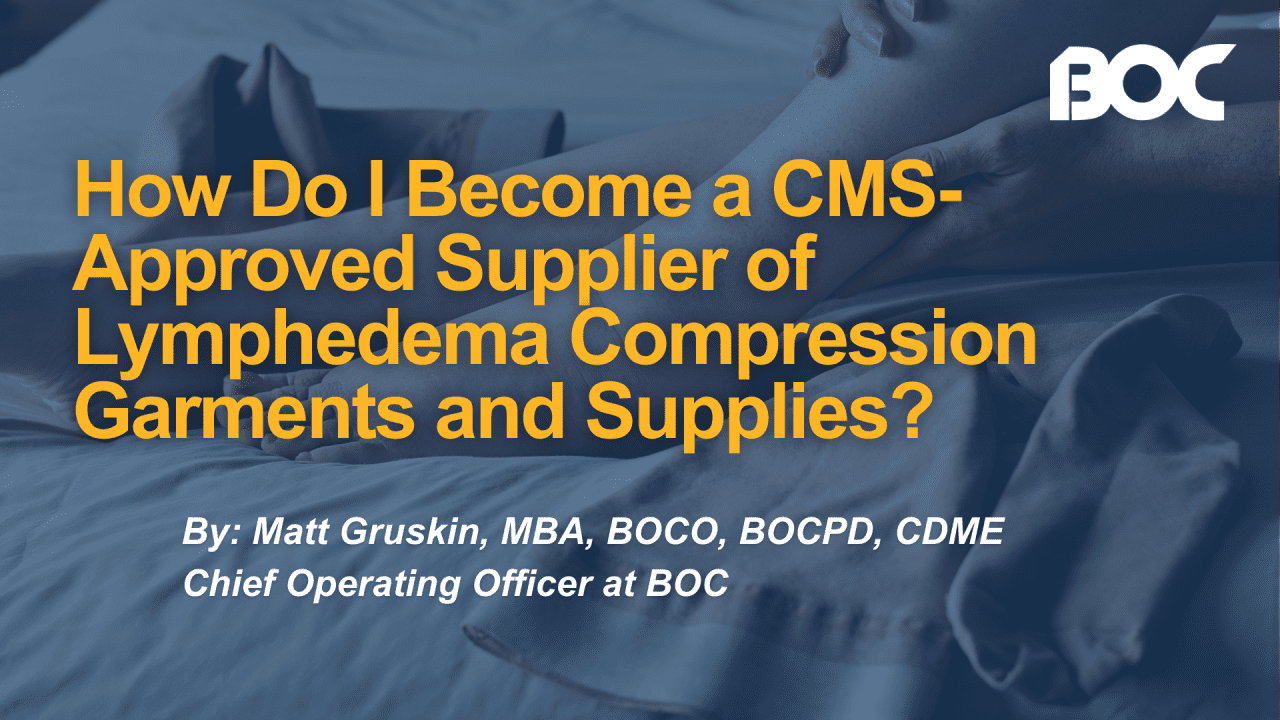
by Matt Gruskin, Chief Operating Officer – BOC
s the calendar turned to January 1, 2024, the practitioners, clinicians, providers, and patients in the Lymphedema community are now able to benefit from a notable advancement in coverage—a Medicare Part B expansion that includes a new category for lymphedema/compression treatment garments and supplies. This development represents a significant victory for both patients struggling with lymphedema and the healthcare providers dedicated to their care.
With the implementation of this new rule, many healthcare professionals are not sure of the steps required to integrate this new Durable Medical Equipment, Prosthetics, Orthotics, and Supplies (DMEPOS) benefit into their practice. To help support these providers, the Board of Certification/Accreditation (BOC) has summarized the steps to become a CMS-approved DMEPOS supplier. Upon completion, this will qualify them to provide and be reimbursed for lymphedema compression treatment items.
The Path to Become a CMS-Approved DMEPOS Supplier
1.) Secure a National Provider Identifier (NPI).
All healthcare providers must obtain an NPI to engage in healthcare transactions, which is the inaugural step toward becoming a lymphedema compression garment supplier. (The NPI in this case is associated with the business, not the individual practitioner.)
2.) Achieve CMS-Approved Accreditation.
There are several steps to becoming accredited, which include meeting CMS Standards documentation requirements and participating in a facility site survey. Earning accreditation qualifies a business to bill Medicare. Accreditation is offered by eight CMS-deemed organizations. BOC is one of the eight, and we offer an accreditation program specifically tailored to suppliers of lymphedema compression treatment items.
3.) Acquire a Surety Bond.
Suppliers are required to secure a $50,000 surety bond, which serves as a financial commitment to adhere to CMS’s standards and regulations.
4.) Procure General Liability Insurance.
Best practice is to obtain a liability insurance policy with at least $300,000 in coverage to safeguard against potential legal claims.
5.) Comply with DMEPOS Standards.
Providers must meet 30 specific Medicare standards. Accrediting organizations validate compliance with these standards, as well.
6.) Register with PECOS & Fee Submission.
The enrollment process includes: registering with the Provider Enrollment, Chain, and Ownership System (PECOS) and/or completing an 855s application (DMEPOS Provider Application); and paying the necessary application fee.
7.) Await Application Approval.
After fulfilling all documentation and fee requirements, providers must await the processing of their PECOS application.
For healthcare practitioners who are new to the accreditation process, BOC offers guidance to help navigate this process thoroughly and efficiently. The BOC Lymphedema/Compression Accreditation Resource Page is an essential starting point for practitioners and suppliers. The BOC Lymphedema/Compression Supplier Enrollment Guide outlines the steps to becoming a recognized supplier. This Guide is a valuable resource for those aiming to provide the full DMEPOS spectrum of compression reimbursable products included in the new benefit to their patients.
BOC is sponsoring a webinar on January 24 that will discuss the steps to become a DMEPOS supplier in greater detail. Register for Understanding the NEW CMS-Approved Lymphedema Compression Coverage Webinar.
Including these specialized medical supplies within Medicare Part B coverage is a monumental step toward enhancing the well-being of individuals with lymphedema. By ensuring access to quality treatment and facilitating proper reimbursement, this coverage expansion paves the way for improved patient care, access, and support across the healthcare community.
If you have questions about how to proceed, or how this change can help you better serve your patients who suffer from lymphedema, please contact BOC COO Matt Gruskin at Matt.Gruskin@bocusa.org.
